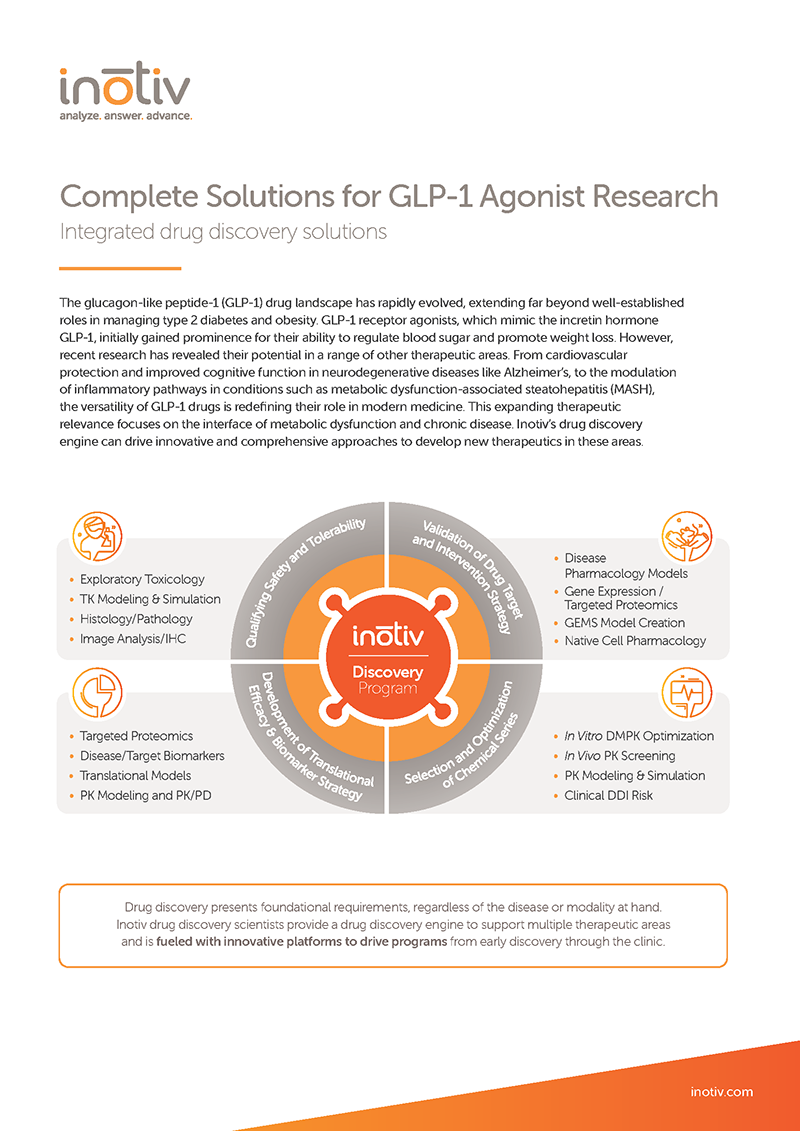Metabolic Disease Models
Tailored In Vivo Models and Pharmacology Services for Obesity, Diabetes, and Other Metabolic Disorders

Advancing Therapies for Metabolic Diseases
Metabolic diseases encompass a diverse group of conditions that disrupt normal metabolic processes, affecting millions of people globally. Common metabolic disorders include obesity, diabetes mellitus, which impairs blood sugar regulation, and metabolic dysfunction-associated fatty liver disease (MAFLD), characterized by excessive fat accumulation in the liver. These conditions can lead to serious complications, including cardiovascular disease, liver failure, and kidney damage. Worldwide, metabolic disorders contribute significantly to morbidity and mortality. Despite available treatments, many patients face progressive disease and severe complications, underscoring the critical need for innovative therapies that target complex metabolic pathways, enhance safety, and improve long-term outcomes.
As a preclinical discovery research organization, Inotiv supports diabetes research, along with obesity and other metabolic diseases, through a broad portfolio of in vivo models and pharmacology studies tailored to drug discovery and development. Our translational models provide clinically relevant insights into treatment effects and safety. Partnering with clients, we customize experimental strategies to align with specific research goals, offering expert analysis from model selection through pharmacological studies and data interpretation, to advance drug development and therapeutic innovation efficiently.
In Vivo Models of Metabolic Diseases
Type I Diabetes Models
Type I diabetes, also known as insulin-dependent diabetes, is caused by the autoimmune destruction of pancreatic beta cells within the pancreatic islets. These insulin-producing beta cells are essential for insulin secretion, and their loss prevents the body from properly regulating blood sugar levels, leading to glucose intolerance. Both genetic predisposition and yet-to-be-identified environmental factors contribute to the development of this condition. While it is typically diagnosed in children and young adults, it can occur at any age. Type I diabetes represents 5–10% of all diabetes cases in the United States. Without insulin therapy, individuals with this condition cannot maintain glucose homeostasis, underscoring the urgent need for ongoing treatment advancements and research into innovative therapies.
Key Models
- Streptozotocin (STZ)-Induced Diabetic Mouse and Rat Model
Type II Diabetes Models
Type II diabetes accounts for 90–95% of all diabetes cases, making it the most common form of the disease. In this type, the body either does not produce enough insulin or cells exhibit insulin resistance, leading to glucose intolerance and elevated blood sugar levels. Impaired glucose tolerance is often a precursor to type II diabetes, indicating reduced efficiency to glucose metabolism before full disease onset. While it primarily affects adults, children and adolescents are increasingly being diagnosed due to rising rates of obesity and sedentary lifestyles. Since the condition develops gradually, early intervention, such as lifestyle modifications, can help slow progression and reduce the risk of diabetic complications.
Key Models
- db/db ± Renin-AAV Diabetic Mouse Model
- BTBR ob/ob Diabetic Mouse Model
- Zucker Diabetic Fatty Rat Model
- ZSF-1 Diabetic Nephropathy Rat Model
Obesity Models
Obesity is a chronic condition characterized by excessive body fat accumulation, significantly increasing the risk of various health issues, including heart disease, stroke, type II diabetes, and certain cancers. In the United States, more than 2 in 5 adults (42.4%) have obesity, and about 1 in 11 adults (9.2%) have severe obesity. Globally, the prevalence of obesity has more than tripled between 1975 and 2022, making it a critical public health concern. Contributing factors include increased consumption of energy-dense foods, sedentary lifestyles, and genetic predispositions.
Key Models
- Diet-Induced Obesity (DIO) Mouse Model
Metabolic Dysfunction-Associated Steatohepatitis (MASH) Models
MASH is an advanced form of MAFLD. This condition arises from the excessive accumulation of fat in the liver unrelated to alcohol consumption. As the disease progresses, it triggers inflammation and liver damage, leading to fibrosis (scarring). In severe cases, MASH may develop into cirrhosis, significantly increasing the likelihood of liver failure or liver cancer. Although the exact causes remain uncertain, risk factors such as obesity, type II diabetes, elevated LDL cholesterol, and metabolic syndrome play a significant role. The rising global rates of obesity and diabetes have fueled an increase in MASH cases, underscoring its growing impact on public health.
Key Models
- Choline Deficient High Fat Diet-Induced MASH Mouse and Rat
Not seeing the model you need? Explore our full range of models for Cardiovascular Disease or contact us to discuss developing a custom model for your metabolic disease drug development program. Our commitment to scientific innovation drives the creation of new models and the refinement of established ones, ensuring advanced solutions for your research.
Selected Study Endpoints
For preclinical drug discovery and development studies for metabolic diseases, we offer a comprehensive range of key endpoints to assess therapeutic efficacy and safety. Here is a sample of our capabilities; however, we offer a broader range of services and work closely with our clients to develop customized solutions tailored to their specific research needs.
- Insulin and glucose tolerance tests
- Body composition by qNMR
- Cardiac function
- Systemic blood pressure
- Glomerular filtration rate (MediBeacon™)
- Grip strength test
- Comprehensive panel of metabolic biomarkers
- Histology and pathology
Comprehensive Services for Drug Development
We provide a full suite of research services to support every stage of drug development, from early discovery to the critical data required for IND filings. Our integrated approach streamlines the process, enhancing efficiency and effectiveness. With a focus on customized solutions, we deliver robust, translational data to drive successful outcomes. Our expertise in preclinical research ensures rigorous evaluation of drug candidates, providing valuable insights to inform development decisions. Explore our key service areas, each designed to support drug discovery and development with precision and expertise.
In Vivo Models for Other Cardiovascular and Related Diseases
Failure Heart
Failure Inotiv provides translational rodent and large animal models, along with flexible research services and expert consultation, to accelerate heart failure drug discovery. Our in vivo pharmacology services deliver clinically relevant insights and robust efficacy data.
Disease Pulmonary
Disease Inotiv provides in vivo models and pharmacology services to support pulmonary disease drug discovery. Our models reflect key features of obstructive, restrictive, and vascular conditions, enabling precise efficacy and safety assessment through customized, expert-guided studies.
Disease Renal
Disease Inotiv offers a diverse portfolio of rodent models of kidney disease and preclinical research services that support drug discovery efforts with clinically relevant and customizable solutions.
Disease Hepatic
Disease Inotiv supports liver disease research with translational models and comprehensive ex vivo and in vivo services. We offer expert guidance and customizable studies to evaluate efficacy, safety, and mechanisms—advancing drug discovery with meaningful, clinically relevant results.



